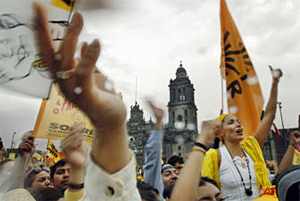 |
 |
 |
 News from Around the Americas | July 2006 News from Around the Americas | July 2006  
Mexican Leader Faces Chilly U.S. Relations
 Lisa J. Adams - Forbes.com Lisa J. Adams - Forbes.com


| | Crowds rallied in the rain for Andres Manuel Lopez Obrador, the Party of the Democratic Revolution candidate, in the square in Mexico City Wednesday. (Michael Connor/Washington Times) |
When the next president takes office, one of his most daunting tasks will be breaking the diplomatic wall of ice that has formed between Mexico and its neighbor to the north.

What Mexico sees as indifference from the White House has combined with antagonism from U.S. groups battling illegal immigration to create a relationship that is strained and chilly.

"Relations with the U.S. look like they are going sour," said Sydney Weintraub, a Mexico expert at the Washington-based International Center for Strategic Studies.

Mexicans are insulted that Republican lawmakers have focused on sealing the border while stalling a Senate proposal that would provide a path to citizenship for millions of illegal immigrants and their families. Mexico is also still stinging from U.S. criticism of its failure to control drug-related violence.

Washington, meanwhile, has not forgotten Mexico's opposition to the Iraq war, and insists that its southern neighbor is not doing enough to stem the tide of illegal migrants north, an issue that will remain front-and-center on the diplomatic agenda in what also is a U.S. election year.

"Immigration will remain an ever-larger and tougher bone of contention," said George Grayson of the College of William & Mary in Virginia.

With his eyes on an immigration accord, outgoing President Vicente Fox made it his mission during his six-year term to maintain a close relationship with the United States and his good friend President Bush - in spite of criticism at home that he was becoming Washington's puppet. Many Mexicans say his intimate ties won him few concrete benefits.

"The sobering effect of these experiences suggests that Mexico's next president will move the country away from Fox's tight embrace of the United States," wrote Pamela K. Starr of the New York think-tank Council on Foreign Relations.

Leftist candidate Andres Manuel Lopez Obrador has promised to do just that. He says as president he would not "be the lackey of any foreign government" - a statement analysts say was a direct reference to the United States - and would return to Mexico's traditional noninterventionist foreign policy.

Felipe Calderon, the candidate of Fox's conservative party, would continue "close cooperation with the United States, but without a warm public embrace," Starr wrote.

Lopez Obrador also has promised to defy certain clauses of the North American Free Trade Agreement. He wants to renegotiate the agricultural sections of the accord, and says he will not allow elimination of tariffs on U.S. corn and beans scheduled for 2008.

Yet he also has said he would maintain a relationship "of respect and cooperation with the United States," and analysts agree he is unlikely to sign on to the harsh anti-U.S. rhetoric of Venezuela's Hugo Chavez or Bolivia's Evo Morales, given the economic and social importance of cross-border ties.

An estimated 11 million Mexicans live in the U.S., sending home about $20 billion every year, while Mexico directs nearly 90 percent of its exports to the United States.

Some have worried Lopez Obrador's election would upset U.S. markets. But those markets have been calmed by the candidate's economic advisers, who say his policies will be fiscally conservative despite his ideas for state intervention, protectionism and subsidies, said Riordan Roett, director of Western Hemisphere studies at Johns Hopkins University.

Although Washington would clearly prefer a victory by the Harvard-educated, free-trade-friendly Calderon, Bush has promised to work with whoever is elected. | 
 | |
 |



